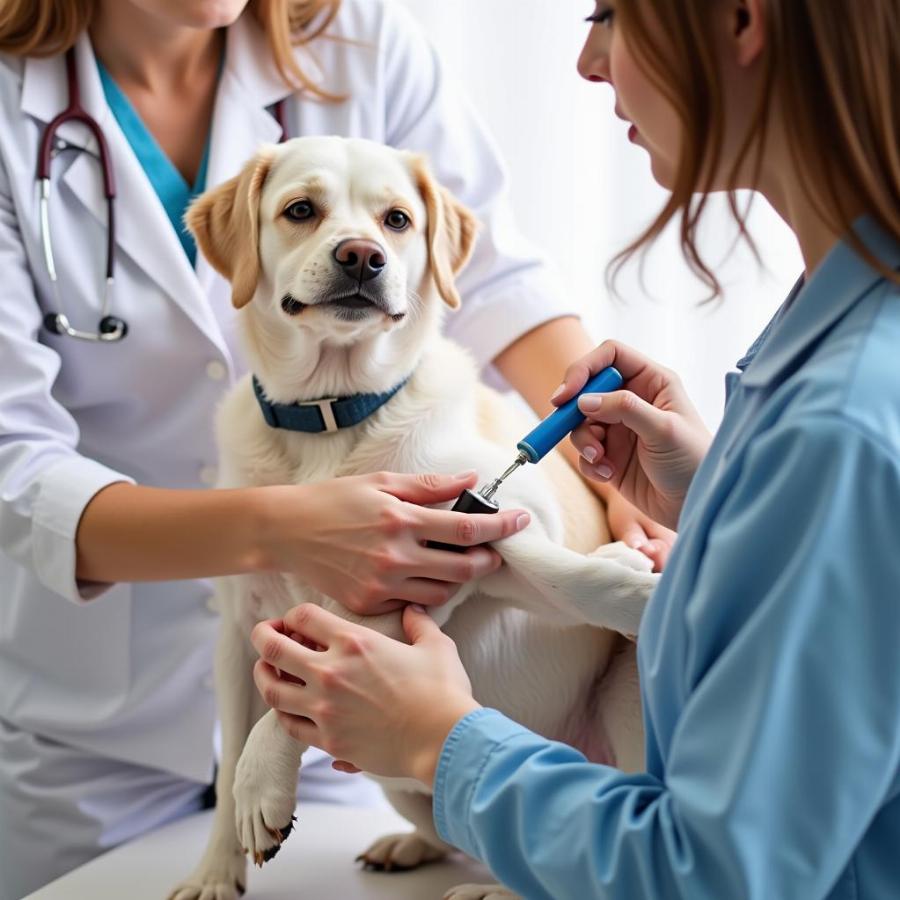High lipase in dogs can be a concerning finding, often indicating an underlying health issue. Lipase is a crucial enzyme primarily produced by the pancreas, responsible for breaking down fats in the digestive system. Elevated levels in the blood often signal a problem, potentially with the pancreas itself. This article will delve into the causes, symptoms, diagnosis, and treatment of high lipase in dogs, empowering you to understand and address this issue effectively.
What Causes High Lipase in Dogs?
Several factors can contribute to elevated lipase levels. Pancreatitis, an inflammation of the pancreas, is a common culprit. Other potential causes include:
- Kidney disease: Impaired kidney function can affect lipase levels.
- Gastrointestinal diseases: Conditions like inflammatory bowel disease (IBD) can sometimes lead to elevated lipase.
- Certain medications: Some drugs can influence lipase levels as a side effect.
- Diabetes mellitus: This metabolic disorder can sometimes be associated with high lipase.
- Dietary indiscretion: Eating fatty or rich foods can temporarily elevate lipase, though usually not to a significant degree.
Understanding the underlying cause is crucial for effective treatment.
Symptoms of High Lipase in Dogs
Unfortunately, high lipase itself doesn’t always present specific symptoms. Instead, you’ll likely observe signs related to the underlying condition causing the elevated lipase. These symptoms might include:
- Vomiting
- Diarrhea
- Loss of appetite
- Lethargy
- Abdominal pain
- Fever
- Dehydration
If your dog exhibits any of these symptoms, it’s essential to consult your veterinarian immediately.
Diagnosing High Lipase in Dogs
Diagnosing high lipase requires a blood test. Your veterinarian will likely recommend a comprehensive blood panel to assess lipase levels alongside other important parameters. This panel helps pinpoint the underlying cause and guide treatment decisions.
 Veterinarian Performing a Blood Test on a Dog to Check Lipase Levels
Veterinarian Performing a Blood Test on a Dog to Check Lipase Levels
What is a Normal Lipase Level in Dogs?
Normal lipase levels in dogs generally range from 20 to 150 U/L (units per liter). However, these values can vary slightly between laboratories. Your veterinarian will interpret your dog’s results based on their overall health and other diagnostic findings.
Treatment for High Lipase in Dogs
Treating high lipase depends entirely on the underlying cause. For pancreatitis, treatment often involves:
- Intravenous fluids: To address dehydration and support organ function.
- Pain management: To alleviate discomfort.
- Nutritional support: This might involve a bland diet or, in severe cases, feeding tubes.
- Medications: To control vomiting, nausea, and inflammation.
For other underlying causes, the treatment will be tailored to the specific condition.
How Can I Help My Dog with High Lipase?
Supporting your dog through this process involves closely following your veterinarian’s instructions regarding medication, diet, and follow-up appointments. Providing a comfortable and stress-free environment can also aid recovery.
Conclusion
High lipase in dogs is a serious indicator of an underlying health problem, often pancreatitis. Early diagnosis and treatment are vital for a positive outcome. By understanding the causes, symptoms, and treatment options, you can be a proactive advocate for your dog’s health. If you suspect your dog has high lipase, don’t hesitate to contact your veterinarian immediately.
FAQs about High Lipase in Dogs
- Can diet affect lipase levels in dogs? Yes, a diet high in fat can temporarily elevate lipase levels.
- Is high lipase always a sign of pancreatitis? No, while pancreatitis is a common cause, other conditions can also contribute to elevated lipase.
- What are the long-term effects of high lipase in dogs? This depends on the underlying cause. Untreated pancreatitis can lead to serious complications.
- How often should I monitor my dog’s lipase levels? Your veterinarian will recommend appropriate monitoring based on your dog’s individual needs.
- Are certain dog breeds more prone to high lipase? Some breeds, like Miniature Schnauzers, are predisposed to pancreatitis.
- Can stress cause high lipase in dogs? While stress doesn’t directly cause high lipase, it can exacerbate existing conditions like pancreatitis.
- What should I feed a dog with high lipase? Your veterinarian will recommend a suitable diet, often a low-fat, easily digestible option.
Related Resources on Beaut Dogs:
- Check out our article on supplement for homemade dog food to learn more about providing balanced nutrition.
- Learn about digestive enzymes dogs and their role in canine health.
About Beaut Dogs
Beaut Dogs is your trusted resource for all things related to canine companions, providing expert advice and insightful information to help you provide the best possible care for your beloved pet. From breed-specific guidance to health and nutrition tips, we empower you to navigate the joys and challenges of dog ownership. When you need support, contact us at Email: [email protected] to get detailed and accurate answers from Beaut Dogs. Visit https://beautdogs.com for more helpful resources and expert advice.